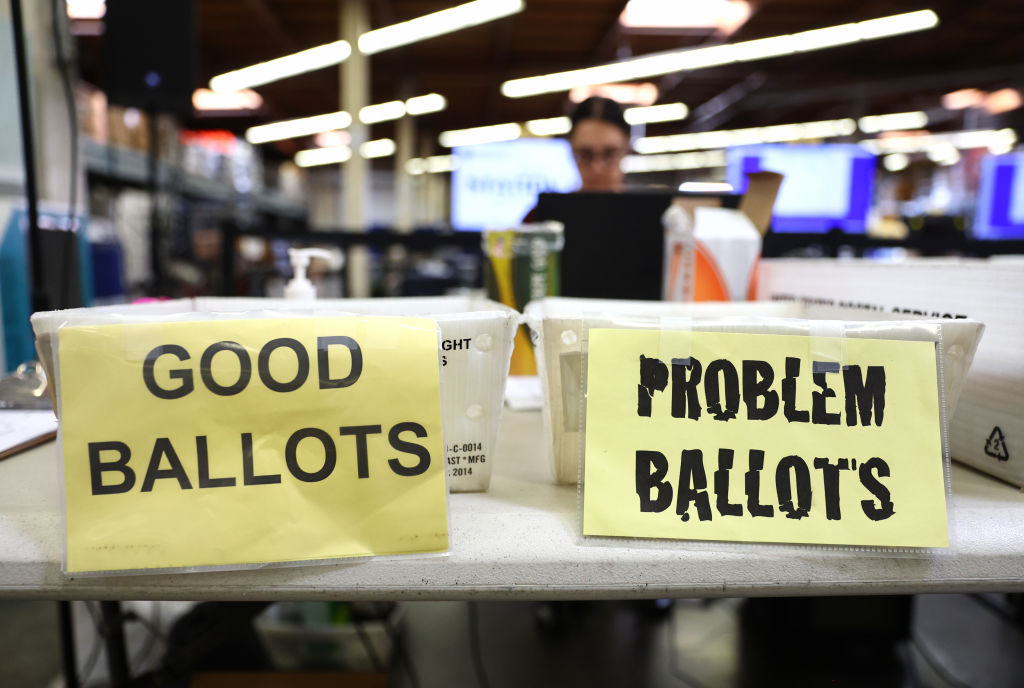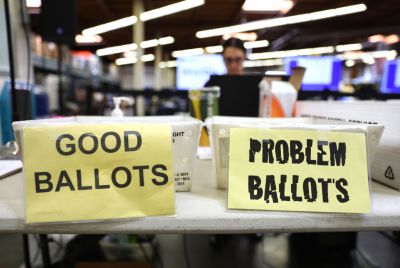Hey, Mom, we made it! The grueling 2022 election season, which featured wildly unprecedented levels of midterm-year spending, will reach its conclusion Tuesday. But as in 2020, it might take a few days to answer the election’s preeminent outstanding question: Which party will take control of the deadlocked U.S. Senate?
Even if all goes to plan, it may be weeks before we know the winner in Georgia’s Senate contest. That’s because Georgia is alone among this year’s battleground states in employing a runoff system for statewide races: If no candidate breaks 50 percent of the vote, the top two vote getters go to a head-to-head contest in January.
That’s far from an implausible outcome in this year’s contest between Democratic Sen. Raphael Warnock and GOP challenger Herschel Walker. The two are neck and neck in the polls—FiveThirtyEight’s polling average favors Warnock by .4 points, while RealClearPolitics gives a 1.5-point edge to Walker. If Libertarian spoiler Chase Oliver grabs a couple points too, as polls have suggested he could, that’s easy runoff material. (In Georgia’s regularly scheduled 2020 Senate contest, Libertarian Shane Hazel got more than 2 percent of the vote, which was enough to force a runoff between Republican Sen. David Perdue and Democrat Jon Ossoff; Ossoff ultimately triumphed in the January 2021 rematch.)
Even the question of whether a runoff will be necessary may take a few days to determine. “A close election will drag it out,” Georgia Deputy Secretary of State Gabe Sterling told The Dispatch. “In Georgia we finished counting before most other states last time, but we had a close race.”
Declaring winners in other states comes down to two primary issues: counting mail-in ballots and the closeness of individual races.
Tabulating mail-in ballots is always more time- and labor-intensive than counting Election-Day votes—envelopes have to be opened, security measures like voter signatures need to be verified, and ballots need to be physically prepared to run through machines. Many states permit election workers to get some sort of jump on the process. In some, such as Florida and Arizona, election workers can process and count mail-in ballots upon receipt. Others, such as Georgia, allow workers to pre-process ballots—opening outer envelopes and verifying that the voter is legal—but not count the ballots until Election Day.
Pennsylvania, where Republican Mehmet Oz and Democrat John Fetterman are competing for an open seat, may be the laggard this year. State law mandates that even ballot processing wait until Election Day morning. So far, the state’s pushing a million early votes. That’s a lot of envelopes to tear open on Election Day before counting can even begin.
Election officials there are preaching patience. “The best we can do is just manage expectations and let voters know that election officials need to do their job,” Acting Secretary of the Commonwealth Leigh Chapman told NBC last week. “Delays in results does not mean anything bad is happening. It doesn’t mean ballots are showing up out of nowhere.”
That’s not to say, of course, that the states that pre-process or pre-count their mail-in votes will necessarily have results the fastest. Arizona can count mail-in ballots immediately upon receipt, but it was one of the last states to be called in the 2020 presidential election simply because the margin between Donald Trump and Joe Biden was razor-thin.
The narrower the margin, the more two additional factors affect vote counting. First, there are the late arrivals: While most important 2022 states mandate mail-in ballots must be received by the end of Election Day, some—most notably, this year, Nevada—permit votes to straggle in provided they were postmarked by Election Day.
Then there’s the ballot-curing process. If a mail-in ballot or ballot envelope has anomalies that would cause the ballot not to be counted, 24 states—including Arizona, Nevada, Georgia, Ohio, Utah, and Florida, all of which have interesting Senate elections this year—require election officials to give the voter in question several days to fix those errors before results are certified. The question will be whether any race is close enough that potentially cured ballots could change the outcome.
Lest the echoes of 2020 reverberate in your head, it’s unlikely we’ll see quite the same level of turbulence as we did in the aftermath of Trump v. Biden. That contest was way off the charts along several axes at once: The first election to feature significantly expanded mail-in voting due to the emergence of COVID-19 also featured a wildly energized electorate deciding whether to reelect one of the most polarizing presidents in U.S. history. As election day dawned in 2020, more than 100 million early votes had already been cast; as of Thursday, this year’s early-vote tally stood at about 33 million.
For anxious election-watchers, the good news is that 2022’s midterm contest has all the makings of an extremely nationalized election: If Republican or Democratic turnout ends up being significantly higher or lower than polls anticipated, that effect is likely to show up more or less everywhere. So it’s likely we’ll know whether Republicans retake the Senate by Election Night.
If things look close, though, don’t stay up.






Please note that we at The Dispatch hold ourselves, our work, and our commenters to a higher standard than other places on the internet. We welcome comments that foster genuine debate or discussion—including comments critical of us or our work—but responses that include ad hominem attacks on fellow Dispatch members or are intended to stoke fear and anger may be moderated.
With your membership, you only have the ability to comment on The Morning Dispatch articles. Consider upgrading to join the conversation everywhere.